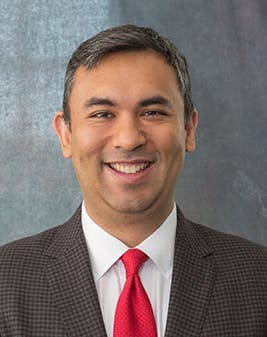New legislation to support dental pros and the RDH shortage: An interview with the president of the Massachusetts Dental Society
Dr. Pamela Maragliano-Muniz: You’ve managed to get two bills passed during your tenure as president of the Massachusetts Dental Society. That is unprecedented! How did you do it?
Dr. Abe Abdul: As a dental student at Tufts and later at Harvard, I saw firsthand how communities struggle with access to dental care. That experience shaped my drive to make a difference. When I started my own practice and became a Medicaid provider, I quickly realized that Medicaid funding was constantly being cut, making it even harder for vulnerable patients to receive care.
For 23 years, I’ve fought to change that, first as an individual advocate and later alongside the Massachusetts Dental Society. Back then, we had very little influence on Beacon Hill. But through years of grassroots efforts, building coalitions, and directly educating legislators, we strengthened our presence. Now we have the strongest advocacy network dentistry has ever seen in Massachusetts. That foundation allowed me to not only write but also successfully pass two crucial bills into law.
PMM: Let’s discuss these bills. The first is H300, the Dental Diversion Bill. Can you tell us what it’s about?
AA: Mental illness and addiction still carry immense stigma. Historically, the system has leaned toward punishment rather than rehabilitation, even for health-care professionals. Before this law, dentists and hygienists facing complaints related to these issues risked losing their licenses, often without a path to redemption.
Dr. Alan Bud has been working for more than a decade to push for change in this area, but progress was difficult. I saw that the only way forward was through legislation, by shifting the focus from punishment to structured rehabilitation. The Dental Diversion Bill ensures that oral health providers have an opportunity to seek help confidentially and to be treated with dignity.
I coauthored this bill with Representative Tackey Chan, emphasizing that it takes entire communities—families, institutions, and financial resources—to cultivate a skilled dentist or hygienist. Rehabilitation, not exclusion, is the most logical and humane way to address the opioid and mental health crises within our profession.
PMM: What impact do you believe this will have on dental professionals?
AA: Right now, we don’t even know how many dentists or hygienists struggle with these issues—that’s part of the problem. Fear of professional ruin has kept many from coming forward.
This law creates a safe space for them to ask for help early. If a complaint is filed, they now have the option to go through rehabilitation instead of immediate disciplinary action. And most importantly, their privacy is protected; records from the rehabilitation process cannot be subpoenaed, and after three years of successful rehabilitation, records will be erased entirely.
Beyond helping individuals, this law also strengthens our workforce. We already have a shortage of hygienists and keeping skilled professionals in the field rather than losing them to preventable issues is a win for both providers and patients.
PMM: The second bill is H4842, known as “The Hygiene Bill.” Can you share what it entails?
AA: This bill, now law, modifies Section 51 of Chapter 112 of the General Laws to address our hygiene workforce shortage. It expands eligibility criteria for dental hygienists by allowing licensure through:
- Graduation from an accredited dental hygiene program.
- Completion of at least four semesters at an accredited dental college.
- Licensure reciprocity for dentists with at least five years of lawful practice in another country, provided their competency standards match those of Massachusetts.
This change opens the door for more qualified professionals to enter the workforce, ensuring better patient access to care.
PMM: How did you come up with this solution for the hygiene shortage?
AA: We’ve known since 2022 that we were heading toward a crisis. Nearly 30% of hygienists planned to retire within five years, and burnout, lack of childcare, and job dissatisfaction were accelerating the decline. More professionals were leaving than entering the field.
The hardest hit communities were those with fewer resources. It was clear that we needed a solution that was realistic, cost-effective, and fast.
Foreign-trained dentists were already allowed to earn a limited license and work in our community health centers. I asked myself—if they’re trusted to perform dentistry for our most vulnerable patients, why shouldn’t they also be allowed to practice hygiene? That was the spark for this legislation. Innovation is critical to solving access-to-care challenges, and this law is a step in that direction.
PMM: You collaborated with multiple organizations while creating this bill. Who provided input and assistance?
AA: This effort was a true collaboration. Representative Chan coauthored the bill with me, bringing invaluable experience and dedication to the cause. The Massachusetts Dental Hygienists’ Association endorsed the bill and provided critical input.
Our team at the Massachusetts Dental Society, including staff, lobbyists, and volunteers, kept the momentum going. Dr. Francis Clairmont and her team made frequent visits to the Statehouse to advocate for the bill. The Alliance of Independent Dentists, led by Dr. Jill Tanzi, played a key role in mobilizing support through petitions. Additionally, the Massachusetts Hispanic Dental Association and the International Hispanic Mission amplified our efforts by rallying their communities to call the Statehouse. Our efforts would not have been possible without every single member of this coalition.
PMM: How will this bill affect the workforce and patient care?
AA: Every year, there are more than 5,000 applications to advanced standing programs for foreign-trained dentists in Boston dental schools. Only about 200 are accepted.
I anticipate that hundreds, if not thousands, of foreign-trained dentists will now consider practicing hygiene in Massachusetts. The demand is already evident; we’ve received countless inquiries about the status of the regulations.
This means a stronger hygiene workforce and improved patient access to care. It may even attract foreign-trained dentists from other states to Massachusetts, strengthening our overall dental care system.
PMM: Are there other issues for which you are actively working on solutions?
AA: There are many issues threatening the health of our nation and state, and we cannot afford to turn a blind eye. One issue that deeply troubles me is the fact that some dental students—our future providers—are suffering from food insecurity. This is simply unacceptable. We are currently assessing the infrastructure of existing school food banks and will do everything in our power to support and strengthen those efforts.
Another critical concern is the crushing burden of student loans, which has become unsustainable. We are actively studying legislation to expand existing grants to include dental students, who are too often excluded from essential financial aid programs.
However, financial relief alone is not enough—dental schools must also receive fair reimbursement for the Medicaid care they provide. Currently, federally qualified health centers (FQHCs) receive higher Medicaid reimbursements than our dental schools, despite the fact that dental schools see just as many, if not more, patients. We are evaluating legislation that would ensure Massachusetts dental schools receive the same reimbursement rates as FQHCs. This may help decelerate the rise in tuition.
Beyond these urgent challenges, organized dentistry must do a better job of serving its members in a practical and forward-thinking manner. Massachusetts has proven that change is possible, and we are committed to pushing even further. We are actively planning our first Mission of Mercy event to provide free dental care to those in need. Additionally, we are developing initiatives to improve access to care for individuals with disabilities, an often-overlooked population. The Massachusetts Dental Society Foundation has embraced a renewed sense of purpose and will play a vital role in driving these efforts forward.
To ensure real progress, I’ve appointed two critical task forces: one focused on access, prevention, and interprofessional relations, and the other on artificial intelligence in dentistry. Our aim is to foster collaboration with other oral health stakeholders while safeguarding the profession and patients we serve.
Water fluoridation, a cornerstone of preventive care, must be protected, and we are mobilizing advocates to defend it. At the same time, we must navigate the rise of AI in dentistry with caution. As someone with a background in coding, I recognize AI’s potential to revolutionize care, but I’m also deeply concerned about its potential misuse. AI must enhance our clinical expertise, not replace it or be manipulated in ways that could undermine patient outcomes.
These are just a few of the pressing issues we’re tackling. We must be bold. We must be relentless. And above all, we must never forget why we fight—to protect the health of our patients and the integrity of our profession.
PMM: If other states would like to pursue similar changes, what advice would you give them?
AA: You must have the courage to embrace change and ideas that may not have originated from the “old boys club.” Organized dentistry, as the voice of the profession, suffers when we focus more on internal politics than on the needs of practicing dentists and their patients. Your success is reflected in your membership statistics—let that be your report card.
Legislation and advocacy are the most powerful tools for driving change. To succeed, you must build strong relationships with your legislators and ensure that dentists, hygienists, and assistants take ownership of advocacy efforts. If only a few are doing the work for the many, the effort will fail. This cultural shift is challenging, but we are reaching a point where it will become impossible to achieve meaningful progress without it.
Your patients are your most important constituents. Educate and advocate to them—they are your most loyal supporters and can become part of your advocacy army. Collaborate with your hygiene association, assistant association, and other nongovernmental organizations. You may not agree with them on everything, and that’s OK. Focus on the areas where you share common ground and remember that we are stronger together.
Pragmatic change is possible. Massachusetts serves as a case study for what can be achieved with persistence, collaboration, and a clear vision.
PMM: Where can we learn more about these bills?
AA: You can find more information about these laws on the Massachusetts Dental Society website at massdental.org. You’re also welcome to reach out to me directly at [email protected].
Editor's note: This article appeared in the April 2025 print edition of Dental Economics magazine. Dentists in North America are eligible for a complimentary print subscription. Sign up here.
Abe Abdul, DMD, MBA, MAGD, ABGD, FAAHD, FICD, FACD, a general practitioner in Quincy, Massachusetts, is president of the Massachusetts Dental Society. He cofounded the Massachusetts Medical Loss Ratio Ballot Initiative and authored laws on dental diversion and foreign-trained dentists. A Tufts Dental graduate, he completed his residency at Harvard Dental and earned a business degree from the University of Massachusetts.










